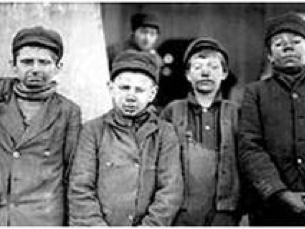
BLOG

Wednesday, August 31, 2011
Back in the 1990’s, Michael Jordan was publicly embarrassed when the world found out that factories making Air Jordan shoes in Pakistan and Cambodia employed 10 year old kids, paid them 22 cents an hour, and often abused them, even, allegedly, tying or chaining them to the work stations! Nike moved quickly to change those conditions, but since then, regular child and female labor abuses keep cropping up in China, Indonesia, and Thailand.
We can’t, therefore, be smug when we read about horrific child labor abuses from the 18th and 19th centuries which we have passed laws against. Read historical accounts of coal mines with shafts barely big enough for 8 year olds to work in them or about textile mills that would often slice children like bread if they slipped while they were changing the spindles on still operating looms. And read here how, even in the refined neighborhoods of London, little boys were sold into slavery to clean chimneys till they died of black lung.
The Chimney Sweeper (Songs of Innocence)
To understand this poem, you’ve got to get the difference, in Blake and in most literature, between innocence and experience. Innocence is a state of sweet naivete’. You don’t know the nasty truth. Experience is the sadder but wiser condition of knowing the crummy ways the world works.
For instance, a young kid might think mommies and daddies love each other and families are all warm and secure. Then the parents start fighting and there’s an ugly divorce and the kid learns that love isn’t always sweet or safe or eternal. That kid has had a tragic loss of innocence. It’s tragic because life would be happier if there were no nasty truths, and because the kid will be less bubbly and positive than before the sad epiphany.
The Adam and Eve story is a perfect example. They ate from the tree of knowledge of good and evil, and suddenly realized that running around naked was an occasion of sin, so they covered themselves with fig leaves or something. Knowing about sin makes sin, and guilt and remorse, a possibility. They were so much happier running around nude, naming the animals! Think of the day they made up “hippopotamus.” They must have laughed out loud!
Anyhow, because this is from Songs of Innocence, we must assume that the young speaker doesn’t realize how horrible his situation is. That disconnect, between what we see and what the speaker thinks, makes this a tremendously powerful poem.
When my mother died I was very young,
And my father sold me while yet my tongue
Could scarcely cry 'weep! 'weep! 'weep! 'weep!
So your chimneys I sweep, and in soot I sleep.
There's little Tom Dacre, who cried when his head,
That curled like a lamb's back, was shaved: so I said,
"Hush, Tom! never mind it, for when your head's bare,
You know that the soot cannot spoil your white hair."
And so he was quiet; and that very night,
As Tom was a-sleeping, he had such a sight, -
That thousands of sweepers, Dick, Joe, Ned, and Jack,
Were all of them locked up in coffins of black.
And by came an angel who had a bright key,
And he opened the coffins and set them all free;
Then down a green plain leaping, laughing, they run,
And wash in a river, and shine in the sun.
Then naked and white, all their bags left behind,
They rise upon clouds and sport in the wind;
And the angel told Tom, if he'd be a good boy,
He'd have God for his father, and never want joy.
And so Tom awoke; and we rose in the dark,
And got with our bags and our brushes to work.
Though the morning was cold, Tom was happy and warm;
So if all do their duty they need not fear harm.
The sweepers would walk up and down the street, calling “Sweep!” to hawk their services, but it sounded like “weep!” Obviously ironic. Note: the father sold him to the sweeping company. With no social welfare system, indigent parents might fool themselves into believing they had secured a business position for their kid. Or, they might just sell the kid and go out and get drunk.
It’s so poignant that the speaker, who is, I guess, more of a veteran (Maybe he’s 7!), takes the other kid under his wing. Tom having hair like a lamb’s back is an obvious Biblical allusion. The lamb was sacrificed in the Old Testament. In the New, Jesus was the innocent lamb who was slaughtered.
The coffins in Tom’s dream are black, like the chimneys the kids are forced to crawl into.
The kids can only look forward to death if they want to be happy and free. They get out of their coffins, their lives in this case, and have fun in a heavenly place.
This hope, that Tom could be good, die, and then have a father again, is so tragic. The chimney sweeps, we infer, have no hope for happiness in this world. You have to see that this is a condemnation of the economy, the government, the Churches, and the culture that lets children be exploited even unto their death, or you don’t get the poem. Despite Tom’s promise of heaven, this is not a happy situation!
The last line is sinister. If the boys do their duty - work themselves to death sweeping chimneys - they need not fear harm - like abuse from the bosses. It reminds me of when nuns used to slap me and say, “Your reward will be in heaven,” when I complained I hadn’t done anything wrong. Exploited people have heard similar arguments for centuries.
